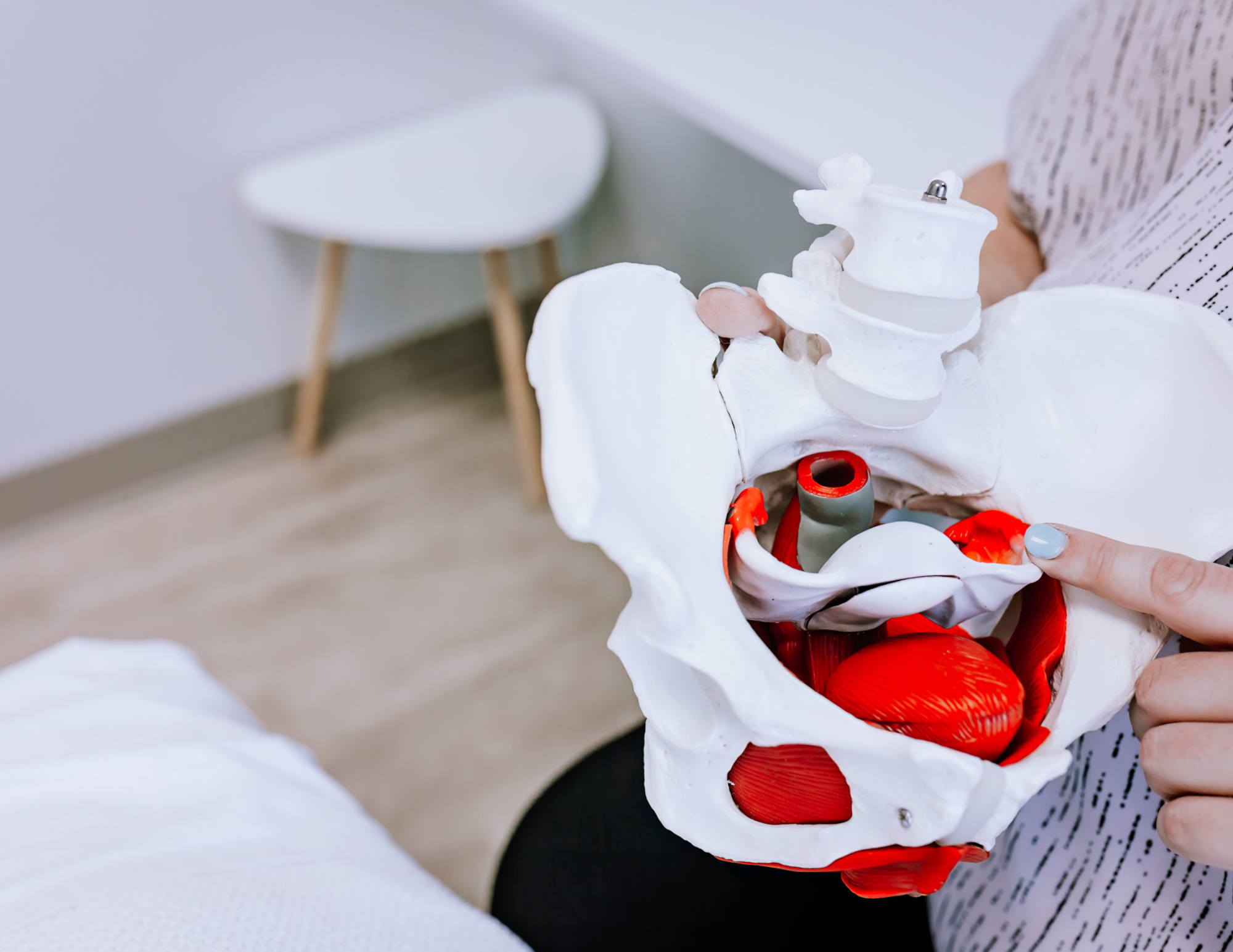%2520(1).png)
Your body has just done one of the most remarkable things it will ever do: grow another human being! After 9 months of waiting, you were probably excited to finally be home with your new baby. While much of your focus and energy during these early weeks and months are on your baby, remember that you also need to take care of yourself, too. Generally, most birthgivers are cleared for sex and exercises by their doctor or midwife at the 6-week postpartum check up appointment. Yet, a body that grows another human for 9 months can take much longer to heal and is in many ways forever changed not just physically but emotionally too.
While many feel better by 6-8 weeks after birth, it may take longer than this to feel like yourself again. Every body, every birth and every baby are so unique, that it is really difficult to judge your own recovery based on what other people are doing and saying.
Remember that your body and mind have just gone through some major changes. Your clothes, breasts, hips and even shoes might fit differently. Not only that, you will be sleeping less and adjusting to life with a new baby can bring on new emotions and stress. Making sure you have the support you need to promote your wellbeing both physically and emotionally will be key in the weeks and months after giving birth. Here are a few suggestions:
Ask For (and Accept!) Help
It may come as no surprise that you will be sleeping less once your baby arrives and you likely won’t have the time or energy to do some of the simple chores like cooking and cleaning. Did you have a birth plan? Well, think of this as your postpartum plan! Who can come over to take out the garbage? Is there someone that can pick up your groceries for you? Could you explore hiring a postpartum doula that can come to your home to help care for you and baby? Can you ask friends and family to create a meal train so that you have food prepared ahead of time for you? While it can feel difficult sometimes to ask for help, the postpartum period is a place for healing and bonding and the more you can have those menial tasks done for you, the better your recovery can be.
Reasonable Expectations About Your Recovery
Your body and brain just went through some major changes and like any life transition it can take time to recover and adjust. The postpartum period comes with so many new learnings and experiences as well as unknowns, that it might feel like you don’t have control over your body or life as a new parent. One thing you do have control over is the opportunity to make some healthy choice to take care of your body and mind. Comparing yourself to others (including looking at celebrities on social media!) can put unattainable and unrealistic expectations on yourself. Do things that make you feel good. Start slow and don’t expect that you will just jump back into your pre-pregnancy exercises and routines immediately.
Where to Start With Exercise?
We often get asked, what exercises should I start with? Our answer is, it depends! There are so many factors that can influence your readiness to get back to exercises and it is important to start slow and to know which exercises are key to helping in postpartum recovery. Quite often there are weaknesses and shifts in the core and pelvis that can lead to pain and discomfort. Many people who have given birth experience pelvic floor issues and it is always a good idea to see a pelvic floor physiotherapist at around 8 weeks postpartum. Be sure to watch for diastasis recti, a common condition where the abdominal muscles separate from each other and cause health issues and weakness in the core. You can ask your care provider, a physiotherapist or see one of our chiropractors who can do an assessment for you.
Back and neck pain are common as parents are often holding and feeding their baby for extended periods of time. It is a good idea to regularly switch the side you carry your baby on and invest in a good baby wrap or carrier to help with the physical stress of holding your baby (and get in some extra skin to skin time!). Pay attention to your posture while feeding your baby which can lead to neck tension and strain.
Our advice for getting back to physical activity is to start with gentle posture awareness and breathing exercises which can even be done shortly after giving birth to aid in your recovery and you can build from there. When you are ready, attend one of our postpartum fitness classes so that you can focus on building back your core and body awareness (and you can bring baby too!).
Eat well!
In the postpartum period, your body will be craving nutrients for its optimal recovery. When you are tired and preoccupied with feeding your baby, it can be easy to just grab a quick sugary snack (or some people completely forget to eat!). Having meals prepared ahead of time or organizing a meal train from friends and family is one of the best ways to make eating well easier. Focus on whole foods including lots of vegetables, whole grains and proteins. Some key nutrients to watch for are iron, Vitamin B12, DHA (an omega-3 fatty acid), Choline and Vitamin D. Seeing our Naturopathic Doctor who specialize in postpartum health is also a great way to support your recovery.
Acceptance of Your New Life
The transition into parenthood is full of ups and downs and can be challenging as you navigate the many changes that come with welcoming a new baby. You may have feelings of insecurity and a sense of loss from your ‘previous’ life and identity. Having a baby can also shift many of your primary relationships and adjusting to this can bring on additional stress and uncertainty. Your postpartum body might also bring on negative feelings of loss both from the body you had and it can be a constant reminder of your identity shift which can feel isolating and overwhelming. If negative feelings come, ask yourself: could I give myself the same love, compassion and advice that I would give a good friend? Be gentle on yourself as you go through this transition and reach out to people who you trust to express your emotions. Talk to one of our mental health counsellors who can support you in your emotional journey!
Find Intentional Moments For You
The first few weeks of the postpartum period can feel overwhelming at times. And while the saying ‘sleep when baby sleeps’ is good advice, this isn’t always a reality for many people, especially those with very little family support or have anxiety. Getting as much rest as possible is important and so too are finding your own moments of mindfulness to reconnect with yourself to find some peace and calm. Try some mindful activities like connecting with your breath for a few minutes or trying an app like MamaZen to recentre yourself. For some, writing in a journal about your concerns or experiences may be a helpful way to let them out. Taking a bath, getting a massage or going out for a walk are also great ways to take care of yourself and get a break from all of the responsibilities of parenthood.
Get Help From An Expert
While experiencing negative feelings about your new life with your baby or postpartum body can be normal, it doesn’t mean that you have to go through it alone. These negative emotions can prevent you from caring for yourself or your baby and it is a good idea to seek professional help to work through your concerns. A combination of support for your body and mind are a good way to balance your postpartum recovery hormonally, physically and mentally. Get support from one of our mental health counsellors who are all well-versed in postpartum mental health and body image concerns. Meet with our Naturopathic Doctor who can work to address any nutritional or hormonal imbalances. And getting bodywork done from our Osteopath, Reflexologist, Massage Therapists, Pelvic Floor Physiotherapist or Chiropractors are an important part of prioritizing your emotional and physical wellbeing.
Bottom Line
A holistic approach to your recovery including emotional and physical support are so important to your overall wellbeing and your ability to care for yourself and your baby. This is why the support network at Rooted Family Wellness Centre was created!!
It might feel challenging at first, but learning to practice self-love and acceptance will go a long way to supporting your journey as a parent and will set a good example for your children in the years to come. Give yourself as much grace, forgiveness and appreciation as you would a friend. Reflect on how amazing you and your body are and take care of them! Feel proud of yourself for the incredible things you are doing as a parent and have compassion for your imperfections. Do your best to accept and honour where you are today, let go of shame and ask for the help you need so you can find joy in your life with your new baby.

.png)

